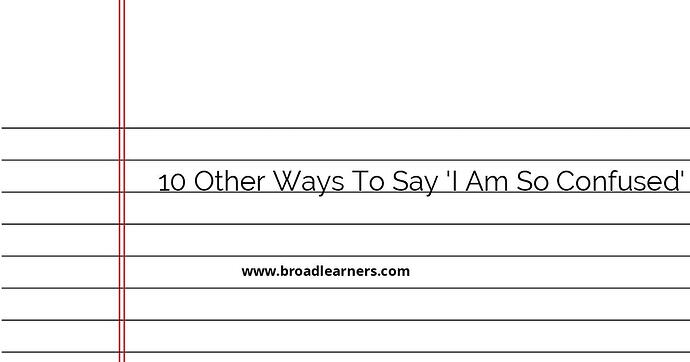Feeling confused is a common experience that we all go through at times. It can be frustrating and overwhelming, but finding the right words to express your confusion can help you communicate more effectively. Here are 10 other ways to say 'I am so confused':
- I'm completely baffled
- I'm at a loss
- I'm utterly bewildered
- I'm thoroughly mixed up
- I'm in a state of perplexity
- I'm puzzled
- I'm disoriented
- I'm muddled
- I'm flummoxed
- I'm dumbfounded
Each of these phrases conveys a sense of confusion, but they may differ slightly in intensity or connotation. Let's explore each alternative in more detail:
1. I'm completely baffled
This phrase suggests a high level of confusion and indicates that you are unable to understand or make sense of a situation or information.
Example: 'After reading the instructions multiple times, I'm completely baffled. I still don't know how to operate this machine.'
2. I'm at a loss
This expression implies a feeling of helplessness or being unable to find a solution. It suggests a lack of understanding or clarity.
Example: 'I'm at a loss. I don't know which decision to make. They all seem equally confusing.'
3. I'm utterly bewildered
If you're utterly bewildered, you are completely perplexed and unable to comprehend what is happening or being said.
Example: 'The sudden turn of events has left me utterly bewildered. I'm struggling to make sense of it all.'
4. I'm thoroughly mixed up
This phrase suggests that your thoughts or understanding are jumbled and in disarray. You feel mentally confused and unable to sort things out.
Example: 'The professor's explanation was so complex that it left me thoroughly mixed up. I need some time to process it.'
5. I'm in a state of perplexity
If you're in a state of perplexity, you are deeply confused and puzzled. You're unsure of what to do or how to proceed.
Example: 'The situation has left me in a state of perplexity. I can't seem to find a clear path forward.'
6. I'm puzzled
This simple expression indicates that you are confused and unable to understand something. It suggests a mild level of confusion.
Example: 'I'm puzzled by your reaction. I don't understand why you're so upset.'
7. I'm disoriented
If you're disoriented, you feel confused and uncertain about your surroundings or situation. You may feel lost or unable to find your bearings.
Example: 'The sudden change in scenery has left me disoriented. I need a moment to collect myself.'
8. I'm muddled
This expression suggests that you have a confused or jumbled mind. Your thoughts are disorganized, making it difficult to think clearly.
Example: 'The complex instructions have left me feeling muddled. I can't seem to grasp the steps.'
9. I'm flummoxed
If you're flummoxed, you are completely perplexed and bewildered. It implies a sense of being caught off guard and unable to comprehend.
Example: 'The unexpected turn of events has left me flummoxed. I didn't see it coming.'
10. I'm dumbfounded
When you're dumbfounded, you are so surprised and confused that you're momentarily unable to speak or react.
Example: 'Her announcement left me dumbfounded. I was speechless and couldn't process the information.'
These phrases can help you express your confusion more precisely in different situations. Consider using them to better convey your feelings and engage in clearer communication.
Did I miss anything? Respond below
